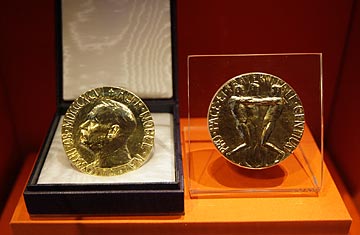
The Nobel Peace Prize
After Alfred Nobel's death in 1896, his executors discovered that the inventor of dynamite had secretly set aside about 35 million Swedish kronor (about $225 million today) for the creation of five annual prizes to honor those who bestowed the "greatest benefit on mankind" in science, literature and diplomacy. On Oct. 9, President Barack Obama won the most coveted and controversial of them all: the Nobel Peace Prize.
The recipient, which Nobel instructed should be the person who has performed the "best work for fraternity between nations, for the abolition or reduction of standing armies and for the holding and promotion of peace congresses," is determined by a five-member committee appointed by Norway's Parliament. Nominations are solicited from an undisclosed number of contributors--past winners, prominent institutions--and the winner is decided by a simple majority vote.
Reaction to the committee's choice has often been anything but peaceful. In 1973, Henry Kissinger and North Vietnam's Le Duc Tho shared the award for negotiating a cease-fire that ended U.S. involvement in the Vietnam War--despite Kissinger's role in the secret bombing of Cambodia. (Tho rejected his award, the only person to do so, saying there was no peace in his country.) One Nobel Committee member resigned in protest over Yasser Arafat's 1994 win, calling the Palestinian leader a "terrorist." Even Joseph Stalin was nominated twice for his efforts to end World War II (he did not win).
Much has been made of Obama's seemingly premature win and the committee's vague reasoning (he promoted "international diplomacy and cooperation between peoples"). Unfortunately, those seeking answers are out of luck: Nobel documents are sealed for 50 years.
